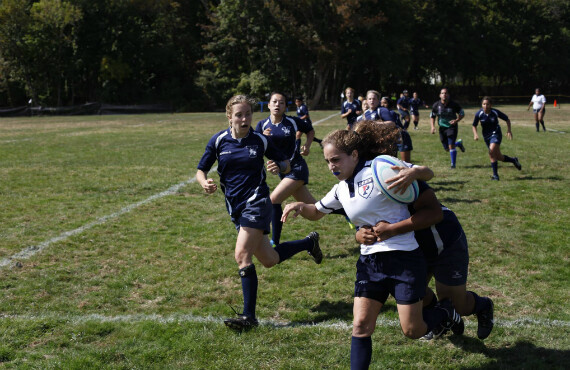Penn Women’s Rugby Levels the Playing Field
So much for sugar and spice. For the nearly 30 undergraduate student-athletes who are members of the Women’s Rugby Club at the University of Pennsylvania, playing nice is not part of the approach.
Rugby, a blend of football, soccer and wrestling, requires bold athleticism and a military-like strategy. In this tough-as-nails sport, there’s no room for niceties.
“Rugby is the toughest sport out there; no doubt about it,” says Lucy Dawson, the co-president of the club and a junior majoring in cognitive neuroscience in the College.
Two teams of 15 players each take the field to run with an oval ball across the opponent’s goal line or kick it through the goal posts. All passes must be thrown backwards. Passing the ball in a forward direction is illegal and results in the team having to give up possession of the ball.
In rugby, the positions are divided into two main categories: forwards, who are numbered 1 through 8, and backs, who are numbered 9 through 15.
The forwards’ primary job is to get the ball from the opposition and start making their way down the field with it. The backs then take the ball from the forwards in order to score a goal, by any means necessary. In rugby, a goal is called “a try” and it’s worth five points.
“Unlike other sports, it’s 80 minutes of non-stop contact, for the forwards, at least. There’s no break when someone gets tackled or there’s a penalty,” Dawson adds. “The game must go on.”
Dawson has played on the team at Penn since the fall of her freshman year. Unlike most college-level rugby players who are brand new to the game, she got hooked on rugby in high school, when she played for the Union County Mudturtles in her hometown of Berkeley Heights, N.J.
“There was a negative stigma about women’s rugby when I started,” she recalls. “The appeal for me is that it’s unlike any sport out there. It’s a really tough sport that takes speed, strength and a lot of skill.”
The Women’s Ruby Club competes all year long and participates in as many as 15 matches, all free and open to the public. All home games are played at Penn Park, usually on Saturday afternoons.
During the fall, the club plays four of the Ivies: Cornell, Columbia, Princeton and Yale. In the spring, they play local teams like St. Joseph’s University, Drexel University, Temple University, Brandywine College and Bryn Mawr College, in addition to participating in a few tournaments.
Penn Women’s Rugby has only been in the Division I Ivy League Conference for two years, but this year they made it to the American Collegiate Rugby Association’s Sweet 16 Championship Tournament at West Point, where the top women’s college rugby teams in the country competed in the regional playoffs.
Their biggest Ivy League rival is Princeton, according to Ariana Bray, a junior health and societies major from Chicago. This spring will be Bray’s fourth season as a player, and she serves as the vice president. Like many on the team, she had never tried rugby before coming to Penn.
“Rugby is amazing because there’s a spot for everyone,” Bray says.
“Part of the appeal of rugby is that all the players are learning at the same time,” says Emily Record, the head coach.. “As a result, players are very supportive; everyone remembers what it is like to be the rookie.”
Rugby is currently experiencing tremendous growth in the United States, particularly among college women. Some players attribute the growth to an increased amount of international publicity.
“USA Rugby has had an overhaul in the past few years," Dawson says, “and they’re starting to advertise more matches on TV and online. This is helping to let Americans know that rugby isn’t just a European sport anymore.”
But according to Bray, rugby is more than just a sport. She says that women’s rugby is an opportunity for individual empowerment against gender-based stereotypes and societal expectations.
“Girls have been told by the media that they have to look and act a certain way,” Bray explains. “Rugby is my way of saying that girls can look and act however they want but still be girls.”
Rugby levels the playing field because everything is the same and everyone abides by the same rules, Record adds. The only difference between men’s rugby and women’s rugby is public perception.
“It’s the only contact sport that doesn’t have different rules for men and women, which gives us a chance to show everyone we’re just as tough –- or tougher –- than the guys,” Dawson says.
Members of the Women’s Rugby Club also see their team as being part of a large family.
“A huge appeal for me is the camaraderie and sportsmanship that’s been present on all the teams I’ve played on. My team is my family at Penn,” Dawson says.
“What sets us apart from a lot of teams is our attitude on and off the field,” Bray says. “Not only do we stay positive even when games aren’t going our way, but we also make an effort to spend time with each other outside of rugby. Being as close as we are has definitely improved our game.”
Also contrary to the aggressive and competitive nature of play on the field, there is a camaraderie among the teams as well.
Dawson says the best part is being able to play and meet the other Ivy teams because they have a lot in common in trying to balance a rigorous academic schedule with sports.
“After games, we hang out with the other team and that’s unlike any other sport out there,” Dawson says. “Winning and losing isn’t always everything.”
The Penn Women’s Rugby Club is always looking for new players, and no experience is necessary. Interested Penn students can contact one of the officers directly or e-mail them at upennwrfc@gmail.com.








